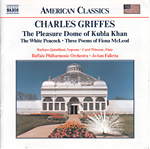The headline work The Pleasure Dome of Kubla Khan comes last on this disc, but “pleasure” is a term that certainly could be applied to the entire collection. Charles Griffes’ orchestral music creates dreamy aural environments that range from the rhapsodic nature idylls of Delius (as in Clouds) to the impressionism of Debussy (The White Peacock and Poem for Flute and Orchestra, featuring fine solo work by Carol Wincenc). The impressionistic haze drapes heavily over Kubla Khan, evoking a quasi dream-state briefly interrupted by violent brass eruptions at the work’s center. Throughout, Griffes’ clear and seemingly glowing orchestration consistently beguiles, especially so in Three Poems of Fiona McLeod, which sounds remarkably similar to the dreamy opening of Schoenberg’s Gurrelieder. Soprano Barbara Quintiliani offers a lucid and beautifully sung rendering of the text, while the Buffalo Philharmonic makes rapturous sounds under JoAnn Falletta’s sensitive and passionate conducting. Naxos’ warm, spacious recording guarantees nearly an hour’s worth of pure enjoyment.
































